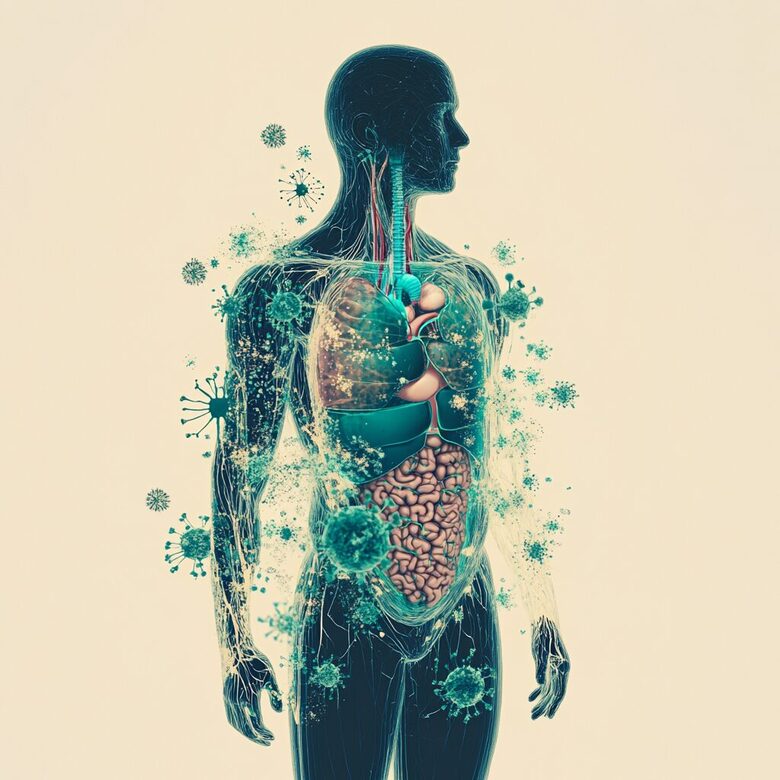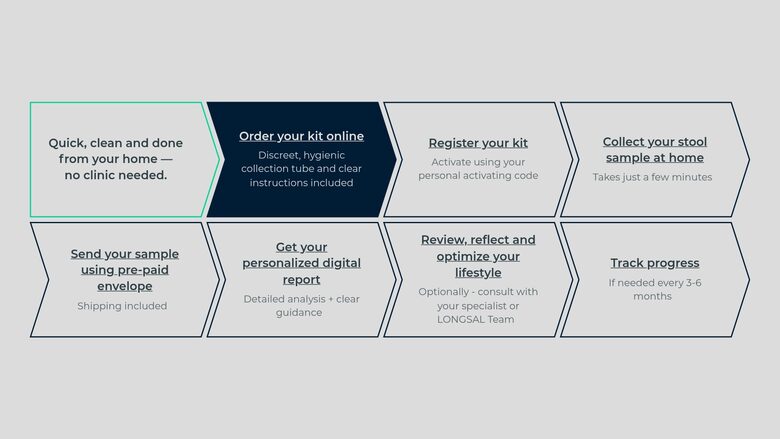The LONGSAL Gut Microbiome Test – Know What Drives Your Health
Your gut is home to trillions of microorganisms that control digestion, immunity, mood, and even skin health.
With the LONGSAL Gut Microbiome Test, you get deep insight into your inner ecosystem—in the comfort of your home.
It’s simple. It’s smart.
It’s your body’s untapped intelligence.
The LONGSAL Gut Microbiome Test
is a scientifically validated, an advanced, clinical-grade and DNA-based stool analysis that maps your gut bacteria using Next-Generation Sequencing (NGS), identifying thousands of bacterial species from a stool sample.
It reveals what’s thriving, what’s imbalanced, and how your gut flora impacts your health (what that means for your digestion, immune system, mood, and metabolism) and provides personalized, science-backed nutritional and lifestyle recommendations.
You receive a science-backed report, easy-to-follow tips and an option to retest and track progress!What Is the Microbiome
and
Why Does It Matter
Your gut microbiome is a community of trillions of bacteria, fungi, and other microbes living in your intestines. It plays a critical role in almost every aspect of your health.
Your Gut Is More Than Digestion - It’s Your Inner Ecosystem
Trillions of bacteria in your gut control vital functions. Modern science shows that your gut health influences your entire body—from digestion to mental clarity to hormone function.A Healthy Microbiome Helps:
Science-Backed Gut Benefits
Strengthen your immune system
Support mood and brain function
Your gut produces up to 90% of your serotonin—a key mood-regulating neurotransmitter. Gut-brain axis regulates cognition and stress response
Sharper Mind – Enhanced clarity, focus & mental balance
Improve digestion & nutrient absorption
Your gut microbiome helps break down complex foods, synthesize essential vitamins (like B12 and K), and regulate bowel movements. It also affects fat storage, insulin sensitivity, and blood pressure.
Better Digestion – More energy, less bloating & stable metabolism
Maintain healthy weight and metabolism
Specific bacteria help control fat storage, blood sugar, and appetite hormones.
Metabolic Balance – Fat regulation, hunger cues, and energy levels
Clearer skin
Reduced inflammation means lower risk of acne, eczema, and other skin conditions.
Glowing Skin – Less acne, eczema, and dryness
Improve cardiovascular health
A healthy gut microbiome helps regulate cholesterol levels, blood pressure, and blood sugar, all of which are key to heart health. Certain gut bacteria also reduce inflammation, a major factor in heart disease.
Better Heart Health – Blood sugar, blood pressure & cholesterol support
Improve sleep quality
The gut microbiome influences the production of sleep-related hormones like serotonin and melatonin. A balanced gut supports a healthy sleep-wake cycle and helps reduce nighttime restlessness.
Improved Sleep – Deeper rest & better recovery
Support muscle function & recovery
The gut-muscle axis links your microbiome to muscle growth, strength, and repair. Healthy gut bacteria aid in protein digestion, nutrient absorption (like amino acids & magnesium), and inflammation control, all essential for muscle performance and recovery.
Stronger Muscles – Better performance & faster recovery
When Balance Breaks - Signs of an Unhealthy Gut
An imbalanced gut microbiome can disrupt nearly every system in your body—from digestion and immunity to mood and metabolism. Recognizing these warning signs is the first step toward restoring optimal health.
Digestive distress & metabolic imbalance
Bloating, constipation, diarrhea, or alternating patterns—often tied to IBS, SIBO, or disrupted gut motility.
Unhealthy gut flora may influence weight gain, insulin resistance, increased cravings, and blood sugar instability.
Cognitive & energy issues
Imbalances may reduce neurotransmitter production and increase inflammation, leading to brain fog, low mood, and chronic fatigue.
Weakened immunity
Poor microbial diversity can impair immune response, increasing susceptibility to infections, allergies, and autoimmune flare-ups.
Nutrient & food issues
Dysbiosis can hinder nutrient absorption (e.g., B12, iron) and trigger food intolerances or sensitivities (e.g., gluten, dairy).
Skin & inflammatory risks
Imbalances may contribute to skin flare-ups, acne, eczema, LPS-related inflammation, SIBO, IBS, leaky gut, or gluten sensitivity.
Sleep & mood disruptions
Altered gut-brain axis function can impact serotonin and melatonin levels, affecting sleep quality, mood regulation, and stress resilience.
What You’ll Discover with the LONGSAL Gut Microbiome Test
Microbial Health Overview
Microbial Diversity Score: Measures how rich and balanced your gut ecosystem is—high diversity = better resilience and digestion.
Species Richness & Evenness: Learn how many types of bacteria you have and whether they coexist in balance.
Dysbiosis Index: Indicates if your gut is out of balance (dysbiosis) and suggests recovery strategies.
Enterotype Classification: Reveals your dominant gut bacterial group (e.g., Bacteroides), which influences how you metabolize food and absorb nutrients.
Gut–Body Interactions
Gut-Immune Axis: Evaluates how well your gut bacteria support your immune system (~70% of immune cells are in your gut).
Inflammatory Potential: Assesses whether harmful bacteria in your gut are likely to cause inflammation via LPS (lipopolysaccharides).
Gut–Skin Axis: Identifies links between your microbiome and conditions like acne, eczema, and psoriasis.
Weight Management Indicators: Shows if your gut flora promotes healthy metabolism or may contribute to weight retention.
Risk Assessments
Leaky Gut Syndrome: Checks whether your microbiome supports a strong gut lining to prevent toxins from entering your bloodstream.
IBS and SIBO Tendencies: Evaluates microbial patterns associated with irritable bowel syndrome or small intestinal bacterial overgrowth.
Gluten Sensitivity Potential: Assesses the likelihood that gluten triggers symptoms or inflammation.
Well-Being & Mental Health
Gut–Brain Axis: Detects imbalances that may affect mood, cognitive function, or stress resilience.
Physical Well-Being Score: Reflects how your gut bacteria support energy levels, recovery, and vitality.
Metabolic Health
Blood Sugar & Insulin Support: Identifies if your bacteria enhance or impair glucose regulation.
Blood Pressure Regulation: Evaluates microbial influence on cardiovascular markers.
Gut–Liver & Gut–Thyroid Axes: Indicates how gut flora affects detox, hormone balance, and metabolic stability.
Detailed Bacterial Mapping
Overview of probiotic, mucin-producing, and butyrate-producing bacteria
F/B Ratio (Firmicutes/Bacteroidetes): Indicates gut balance in relation to weight/metabolic risk
Raw data for professionals or advanced users
This comprehensive report gives you a deep, personalized look inside your gut ecosystem.
From microbial diversity and immune function to metabolism, mood, and inflammation risk, you'll uncover how your microbiome is impacting your overall health—and what to do about it.
Actionable insights, expert-curated strategies, and detailed bacterial mapping make it easy to take control of your gut health.
How You Can Use the Report
Understand Your Body
- Know exactly what’s going on inside your gut
- Identify bacterial imbalances, inflammation risks, and functional deficits
- Discover how your gut may be impacting digestion, mood, immunity, and energy
Take Action with Personalized Advice
- Nutritional strategies (e.g., fiber intake, polyphenol-rich foods, fermented foods)
- Lifestyle modifications (e.g., movement, stress management, hydration, intermittent fasting)
- Supplement suggestions (e.g., probiotics, omega-3s, prebiotics)
- Targeted actions for common concerns: bloating, fatigue, acne, cravings, sleep issues
Use It for Collaboration or Self-Care
- Bring your report to your nutritionist, gastroenterologist, or longevity specialist
- Or follow the expert-curated, easy-to-understand recommendations provided in the report
- Great tool for anyone in functional medicine, coaching, or biohacking circles
Track Your Progress
- Re-test every 3–6 months to monitor changes, measure improvement, and fine-tune your approach
- Compare data over time to see how your diet, lifestyle, or supplements are working
- Build a long-term gut health strategy based on real insights—not guesswork
Who Should Get This Test
- Individuals with chronic digestive issues
- People experiencing unexplained fatigue, skin problems, or mood swings
- Health-conscious individuals interested in biohacking or personalized nutrition
- Patients working with functional or integrative medicine practitioners
- Those with autoimmune conditions or frequent infections
- Anyone struggling with weight management, cravings, or blood sugar imbalance
- Individuals with food intolerances or sensitivities (e.g., gluten, dairy)
- People with sleep disturbances, anxiety, or depression linked to gut-brain axis
- Athletes seeking improved recovery, endurance, and nutrient optimization
- Individuals with a history of long-term antibiotic or medication use
Who Should Get This Test
- Individuals with chronic digestive issues
- People experiencing unexplained fatigue, skin problems, or mood swings
- Health-conscious individuals interested in biohacking or personalized nutrition
- Patients working with functional or integrative medicine practitioners
- Those with autoimmune conditions or frequent infections
- Anyone struggling with weight management, cravings, or blood sugar imbalance
- Individuals with food intolerances or sensitivities (e.g., gluten, dairy)
- People with sleep disturbances, anxiety, or depression linked to gut-brain axis
- Athletes seeking improved recovery, endurance, and nutrient optimization
- Individuals with a history of long-term antibiotic or medication use



